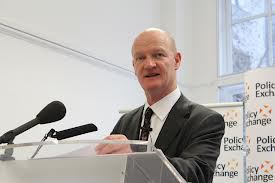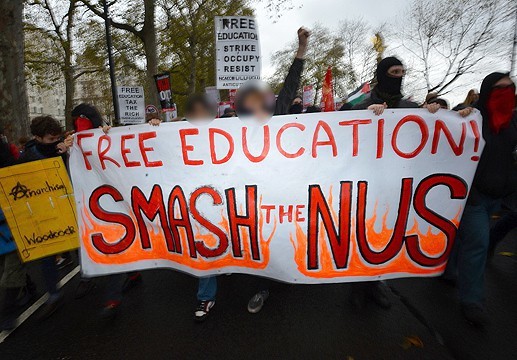Part I: How much power in the union?
(I suspect I’m going to be challenged on just about every aspect of what follows.)
Students’ unions and the National Union of Students, which recently celebrated its 90th birthday, have a long and distinctive history in UK higher and further education. There have been major shifts in recent years though, in both FE and HE. This piece will focus very much on higher education which is not to say FE isn’t hugely important – it is, and is reflected in the election of the first ever NUS President from FE – but rather is a topic for another day. The character of HE unions has changed significantly in the past decade in particular – whilst always concerned with the representational, support and extra-curricular aspects of student life they are now much more directly interested in and increasingly involved with the core issues of teaching and learning. A clear indication of this is that the National Student Survey (NSS) now includes a specific question on students’ unions. Whilst I think the NSS question itself is not terribly valuable it is symbolically important, signalling the value placed on the students’ union in the context of student satisfaction.
 I am a big fan of students’ unions and the student movement (as it is sometimes, perhaps rather inaccurately, known). Whilst they can often be challenging and make life difficult for university leaders, they nevertheless have huge amount to contribute to campus life. As an undergraduate at a disaffiliated university back in the 80s I was massively disappointed not to be a member of NUS but nevertheless greatly enjoyed local student unionism. NUS has a fascinating history, one which was largely non-political until the late 1960s when it dropped its non-political stance, and since then has leaned left to a greater or lesser extent. During most of the past 45 years or so though the political dimension of the Union has appeared to be its defining characteristic.
I am a big fan of students’ unions and the student movement (as it is sometimes, perhaps rather inaccurately, known). Whilst they can often be challenging and make life difficult for university leaders, they nevertheless have huge amount to contribute to campus life. As an undergraduate at a disaffiliated university back in the 80s I was massively disappointed not to be a member of NUS but nevertheless greatly enjoyed local student unionism. NUS has a fascinating history, one which was largely non-political until the late 1960s when it dropped its non-political stance, and since then has leaned left to a greater or lesser extent. During most of the past 45 years or so though the political dimension of the Union has appeared to be its defining characteristic.
However, that has all changed in the past few years. NUS appears, quite remarkably, to have transformed itself from an organisation where the default activity was a demo and one where national conference and standing orders dictated activity to something which would be almost unrecognisable to those activists from previous decades. Now NUS is seen as a rather effective lobbying body and an organisation which is a sought after partner of government and national HE agencies rather than purely a voice of opposition. A recent piece in the Guardian, which previews a new piece of research by the Leadership Foundation, notes the much closer alignment which now exists between student leaders and university managers.
How did this come about? I honestly don’t know but I suspect that an awful lot is down to a succession of talented presidents and some excellent staff working together to deliver a strategic transformation born out of a realisation that after major defeats on fees a different approach was required in order to secure the union’s future existence. A major review of governance in NUS, which concluded in 2007, although it does not look on the face of it to be a huge departure from previous positions may in fact have been key here.
The mission and vision is perhaps not that surprising although the environmental concern is undoubtedly relatively new and demands for a “quality learning experience” has not appeared on many placards down the years:
Our mission
Our mission is to promote, defend and extend the rights of students and to develop and champion strong students’ unions.
Our vision
Our vision is of NUS as a pioneering, innovative and powerful campaigning organisation: the national voice of students.
We will fight barriers to education, empower students to shape both a quality learning experience and the world around them, supporting influential, democratic and well-resourced students’ unions.
Our ethics
NUS and students feel passionately about the environment.
Ethical and Environmental principles are core to our culture. These values underpin all of our work and have done for over 30 years.

In the year I graduated, when Vicky Phillps was President, some of the key issues for NUS were Apartheid, Israel/Palestine (that’s not changed), welfare reform and equality issues.
NUS could not have been further from influencing government on any of these (although this is not to say that contribution to Anti-Apartheid was not significant, it was) but look at where we are now. NUS seems to be a keen supporter of the following:
- The Key Information Set – a key element of the marketisation of higher education
- Unistats
- The Office of the Independent Adjudicator
- Which? University
- The new Student Engagement unit
- The HEFCE-funded Student Green Fund
- QAA involvement with students as active members of review teams
- And, perhaps most significantly, the National Student Survey, now with an extra question about Students’ Unions thanks to NUS lobbying.
This support for a government-inspired survey of students would seem on the face of it to be a bit of a surprise but speaking to the Telegraph back in September 2012, Liam Burns, then NUS President said:
We have supported and worked with the NSS since it began in 2005 as a tool for securing improvement to student experience. Although in that time progress has not been as rapid as we would have liked, particularly in areas such as assessment and feedback, results have continued to improve year on year and they must continue to do so.
In addition, NUS is keenly supporting the Office of Fair Trading which has recently undertaken an investigation into alleged unfair terms imposed by universities on students and wider examination of the operation of the market in undergraduate student recruitment.

In all of these cases, it would not be unfair to suggest that the NUS view is closer to that of the current Government than to that of many university vice-chancellors (although they are a diverse bunch). Indeed at times it is indistinguishable and NUS officers these days often look like they are best mates with the Universities Minister and appear to have easy access to the Department of Business, Innovation and Skills.
This coziness is reinforced by the section of NUS website modestly entitled ‘Our impact on history’:
NUS sits on the boards of HEFCE, the Office of the Independent Adjudicator (OFFA) and UCAS.
Where there is an advisory board, strategic committee or working group, there is NUS, working alongside the sector to present the views of students and ensure their interests are taken into account.
Students are now intimately engaged in every aspect of quality: students act as peer reviewers for institutional review, and students’ unions are invited to submit a student-written submission as part of evidence submitted on the quality of an institution’s provision.
The Quality Assurance Agency has a student sounding board, and is currently funding projects based within NUS to enhance student engagement in quality enhancement at course level.
The Higher Education Academy has worked with NUS for the last two years, undertaking a major project on student engagement – exploring how students can act to shape their educational environment through provision of feedback and representation.
NUS is also working with HEA to deliver student-led teaching awards at institutions around the UK, helping students to recognise excellence in teaching.
NUS is developing its relationship with the Office of the Independent Adjudicator. Fearful of the impact on students of the new fees and student support regime, NUS successfully worked with OFFA to ensure students’ unions would be consulted in the creation of institutional access agreements.
Beyond these big current policy agenda NUS seems to offer much more in the way of activities in support of students’ unions, their core operations and the training and development of students’ union officers. Moreover its professional staff seems to be much more concerned with developing policies, practice and services which will directly help students rather than any broader political activity.
Not so long ago all of this would have been seen by many NUS members as a betrayal of the organisation and its principles (and no doubt sparked some kind of demonstration or occupation of somewhere). So is student activism dead as a recent piece in the Huffington Post proposed?
Student activism was once a force to be reckoned with. It changed the world, visibly and profoundly. It was the catalysts that lead to the end of the Vietnam War, it pressured governments to finally stop supporting apartheid and it forced the world to start addressing institutionalized racism. But today, in the face of genuine and widely felt grievances, students are impotent and apathetic. Universities are businesses, education is job training and a degree is a holiday.

Has student political activity been replaced by “lad culture” as this author suggests? No, but there has nevertheless been quite an extraordinary change in the student political arena in a relatively short period of time. (This is not to say that “lad culture” is not an issue nor that it is not being taken seriously as this NUS campaign and recent summit demonstrate.)
Fundamentally it seems to me to be down to a recognition that NUS is there to serve all of its members and represent their interests rather than simply campaign for or against matters determined by a highly politicised executive. A more cynical observer though may suggest that NUS appears to have been at least partially co-opted into successive governments’ higher education agenda and to have been seduced by the BIS “students at the heart of the system” line. Even if this were true though it is undoubtedly a profound shift which has taken place.
Changes in students’ unions seem to have taken place in parallel to these developments and we will look at these in the second part of this piece.
(Enormous thanks to Aaron Porter for his extremely helpful comments on a draft of this piece.)












Nice piece. I am amazed that you’ve managed to keep the word ‘neo-liberalism’ out of this blog entry! In my own travels in the field of student engagement I am now so used to hearing the term that it felt both odd and delightful to read comments on the changed student movement without it being used. The crucial change from activism on national, international and student topics to taking a seat at the negotiating tables within both institutions and the sector, is that due to specific policy changes, the student voice has now been invited in. Whatever we think of… Read more »